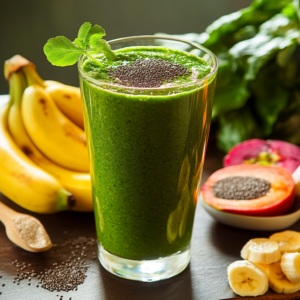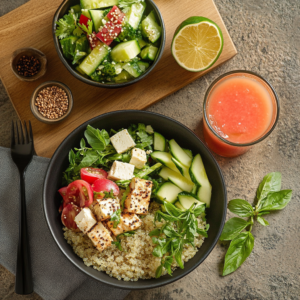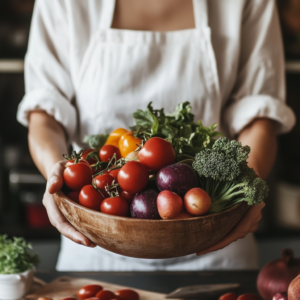Introduction
I vividly remember a time when fatigue was a constant companion in my daily life. Even though I slept enough, my energy levels were low and it affected both my productivity and overall well-being. During my transition to a vegan diet, I discovered the transformative power of plant-based nutrition in boosting energy. In this comprehensive guide, I share my personal experiences and practical strategies on how to boost your energy with a vegan diet. I cover everything from the critical roles of macronutrients and micronutrients to incorporating specific energy-enhancing foods and optimizing meal timings. Whether you’re new to veganism or a seasoned plant-based eater looking to optimize your vitality, you’ll find valuable insights here to harness the natural power of whole foods. For quick recipes that help maintain high energy, check out Quick and Delicious Vegan Recipes for Busy Weeknights, and for budget-friendly meal ideas, explore Budget-Friendly Vegan Meals That Don’t Sacrifice Taste.

Understanding Energy and Nutrition
The Role of Macronutrients in Energy Production
Energy in our bodies is primarily derived from three macronutrients: carbohydrates, proteins, and fats. Carbohydrates, particularly the complex ones found in whole grains and legumes, provide a slow, steady release of energy that helps maintain stable blood sugar levels throughout the day. Unlike simple sugars that cause quick spikes and crashes, complex carbohydrates ensure a continuous flow of energy. Protein sources from beans, tofu, and nuts support muscle repair and help maintain metabolic function without the heaviness sometimes experienced with animal-based proteins. Additionally, healthy fats—sourced from avocados, nuts, seeds, and olives—not only provide energy but also aid in the absorption of fat-soluble vitamins, supporting overall vitality.
Micronutrients and Their Impact on Vitality
While macronutrients provide the fuel, micronutrients are essential for converting that fuel into energy your body can use. For example, iron is crucial for transporting oxygen in the blood, and vitamin B12 is necessary for proper nerve function and energy metabolism. Magnesium plays a significant role in cellular energy production, and antioxidants from vitamins C and E help reduce oxidative stress that can drain energy. A well-planned vegan diet, rich in fruits, vegetables, nuts, and fortified foods, ensures you receive these critical micronutrients. For more insights into nutrient balance, see 10 Essential Vegan Nutrition Tips for a Healthier Life.
Key Takeaways:
– Complex carbohydrates provide sustained energy and help prevent blood sugar spikes.
– Plant-based proteins and healthy fats are essential for muscle repair and metabolism.
– Micronutrients are vital for converting food into usable energy and reducing fatigue.
Key Vegan Foods for Enhanced Energy
Complex Carbohydrates and Whole Grains
Whole grains such as brown rice, quinoa, oats, and barley are excellent sources of complex carbohydrates. Their slow and steady release of energy helps prevent mid-afternoon slumps. They are rich in fiber, which aids digestion and helps keep blood sugar levels stable. Incorporating these grains, along with nutrient-dense options like sweet potatoes and whole-wheat bread, ensures your body receives long-lasting fuel.
Plant-Based Proteins and Their Benefits
Proteins are essential for the repair and growth of body tissues. High-quality vegan proteins include legumes (such as lentils, chickpeas, and black beans), tofu, tempeh, and seitan. These foods supply the necessary amino acids to support muscle repair and maintain metabolic processes without the heaviness often associated with animal proteins. A varied intake ensures a complete amino acid profile, which is crucial for sustained energy.
Healthy Fats and Omega-3 Fatty Acids
Fats serve as a key source of energy and aid in the absorption of essential vitamins. Avocados, nuts, seeds (especially flaxseeds, chia seeds, and hemp seeds), and olives are excellent sources of healthy fats that not only boost energy but also improve cardiovascular health and reduce inflammation. Omega-3 fatty acids, found in walnuts and flaxseeds, are particularly important for brain function and maintaining mental clarity.
Key Takeaways:
– Whole grains deliver consistent, long-lasting energy.
– A diverse range of plant-based proteins supports muscle and metabolic health.
– Healthy fats and omega-3s are essential for energy, brain function, and reducing inflammation.

Meal Timing and Energy Levels
The Importance of a Balanced Breakfast
Starting your day with a nutritious breakfast is key to maintaining energy. A balanced vegan breakfast might include oatmeal topped with fresh berries, a sprinkle of nuts, and a dash of cinnamon. This combination offers complex carbohydrates, protein, and healthy fats that stabilize blood sugar and fuel your morning.
Midday Meals and Snacks for Sustained Energy
Lunch and snacks are vital for keeping energy levels stable throughout the day. A nutrient-dense lunch that combines vegetables, whole grains, and legumes can provide the necessary fuel until dinner. Incorporating snacks such as fruit, nuts, or a protein-packed smoothie helps bridge the gap between meals and prevents energy dips.
Dinner Strategies to Prevent Fatigue
Dinner should be satisfying yet not overly heavy. Aim for a balanced meal that includes lean plant-based proteins, whole grains, and a variety of vegetables. A well-planned dinner replenishes your energy stores and supports a restful night’s sleep, which is crucial for overall recovery and sustained energy.
Key Takeaways:
– A balanced breakfast is essential for a productive start.
– Regular meal timing and healthy snacks maintain stable energy levels.
– A nutrient-rich dinner supports recovery and prepares you for the next day.
Practical Tips to Boost Energy on a Vegan Diet
Hydration and Its Vital Role
Staying well-hydrated is fundamental for high energy levels. Water is essential for digestion and nutrient transport, so aim for at least eight glasses per day. Consider herbal teas or fruit-infused water for variety. Proper hydration prevents fatigue and ensures that your body efficiently uses the nutrients you consume.
Incorporating Superfoods for a Quick Energy Boost
Certain superfoods are celebrated for their ability to boost energy quickly. For instance, spirulina and chlorella are nutrient-dense algae that provide concentrated doses of vitamins, minerals, and antioxidants. Other superfoods such as goji berries, maca powder, and acai can be added to smoothies or sprinkled on oatmeal to deliver an immediate energy boost and support overall health.
Avoiding Energy Drainers in Your Diet
It’s important to identify and avoid foods that drain your energy. Highly processed foods, excessive sugars, and refined carbohydrates can cause rapid energy spikes followed by crashes. Instead, focus on whole, nutrient-dense foods that offer steady, long-lasting energy throughout the day.
Key Takeaways:
– Adequate hydration is crucial for metabolic efficiency and energy production.
– Superfoods provide a concentrated burst of nutrients for a quick energy boost.
– Avoiding processed and sugary foods is key to preventing energy crashes.
Lifestyle Strategies to Enhance Energy
Regular Exercise and Its Synergy with Diet
Regular physical activity is a proven energy booster. Exercise improves circulation, boosts mood, and increases stamina. Combining cardio, strength training, and flexibility exercises with your vegan diet can significantly elevate your energy levels. Even a short walk or a brief yoga session can refresh both body and mind, leading to sustained energy and improved overall well-being.
Sleep, Stress Management, and Energy Balance
Quality sleep—aiming for 7-9 hours per night—is essential for recovery and energy replenishment. Additionally, managing stress through mindfulness, meditation, or leisure activities plays a critical role in preventing mental fatigue. A balanced approach that includes regular exercise, proper nutrition, and sufficient rest creates a holistic strategy for maintaining both physical and mental energy.
Key Takeaways:
– Regular exercise enhances energy and supports overall health.
– Adequate sleep and stress management are vital for maintaining vitality.
– A balanced lifestyle fosters sustained energy and mental clarity.
Sample Vegan Meal Plan for Increased Energy
Daily Meal Ideas and Recipes
• Breakfast: Begin with a hearty bowl of oatmeal topped with sliced bananas, berries, chia seeds, and walnuts to supply a balanced mix of complex carbohydrates, protein, and healthy fats.
• Morning Snack: Enjoy a green smoothie made with spinach, mango, almond milk, and a scoop of vegan protein powder to replenish vitamins and maintain hydration.
• Lunch: Prepare a colorful quinoa salad with black beans, diced bell peppers, corn, cherry tomatoes, and avocado, dressed with lime juice and a drizzle of olive oil to provide a complete blend of macronutrients and micronutrients.
• Afternoon Snack: Have a small bowl of mixed nuts and an apple to offer a satisfying combination of protein and fiber, keeping your energy steady until dinner.
• Dinner: Savor a lentil curry served over brown rice, accompanied by steamed broccoli and carrots, delivering a nutrient-rich, energy-sustaining meal.
• Evening Snack (Optional): A warm cup of herbal tea and a small piece of dark chocolate serve as a light treat to boost energy before bed.
Key Takeaways:
– A structured meal plan helps maintain consistent energy throughout the day.
– Balanced meals and nutrient-dense snacks are essential to prevent energy dips.
– Variety in food choices ensures a broad intake of nutrients for overall vitality.

Social and Practical Tips for Maintaining Energy on the Go
Communicating with Friends and Family
Adopting a vegan lifestyle can sometimes puzzle those unfamiliar with plant-based diets. Friends and family might question whether you’re getting enough protein or express concerns about your dietary changes. Clearly explaining your motivations—whether they stem from ethical reasons, health benefits, or environmental sustainability—can help them understand your choices. Offering to cook or bring a vegan dish to gatherings demonstrates that vegan meals can be both delicious and satisfying, often winning over skeptics with their flavor.
Tips for Restaurants, Travel, and Gatherings
• Check menus in advance: Many restaurants offer vegan-friendly options; review their menus online or call ahead to ensure suitable choices.
• Polite requests: Don’t hesitate to ask for modifications, such as “no cheese” or extra vegetables, to tailor dishes to your dietary needs.
• Travel prepared: For long trips, pack nutritious snacks like nuts, dried fruits, or energy bars, and research vegan dining options before you travel.
• Social functions: Consider bringing a substantial vegan dish to events; this ensures you have something delicious to eat while introducing others to the diversity of vegan cuisine.
Key Takeaways:
– Clear communication about your vegan lifestyle helps others understand your choices.
– Planning ahead for dining out and travel is essential to staying on track.
– Sharing vegan dishes at social events can gradually familiarize non-vegans with the benefits of a plant-based diet.
Maintaining Motivation and Overcoming Obstacles
Cravings, Plateaus, and Accountability
It is common to experience cravings for non-vegan favorites like cheese or meat, especially during the early stages of your transition. Experiment with vegan alternatives—such as cashew cheese or plant-based meat substitutes—and add nutrient-dense toppings like olives or nut-based sauces to satisfy these cravings. Keeping a food diary can help identify nutritional gaps or recurring patterns that contribute to cravings. If progress stalls, revisit your motivations and assess whether your diet is meeting your needs. Engaging with a supportive community can provide additional accountability and encouragement.
Tapping into Vegan Communities
Online forums, social media groups, and local vegan meetups are invaluable resources for sharing recipes, asking questions, and celebrating milestones. These communities offer practical advice and moral support, helping you overcome challenges—whether they arise from budget constraints or social pressures—and keeping you motivated throughout your vegan journey.
Key Takeaways:
– A balanced nutrient intake can help reduce cravings.
– A food diary is an effective tool for tracking progress and identifying improvement areas.
– Active engagement in vegan communities offers continuous support and inspiration.
Relevant External Resources and Community Support
Scientific Studies and Nutritional Guidelines
Numerous scientific studies and guidelines from reputable organizations, such as the USDA and the Academy of Nutrition and Dietetics, support the benefits of a well-planned vegan diet for energy and overall health. These resources provide detailed recommendations for nutrient intake and validate the role of plant-based foods in boosting energy. They serve as reliable references to ensure your diet remains balanced and effective.
YouTube Channels and Online Communities
Online platforms like YouTube offer a wealth of videos on vegan nutrition and energy-boosting recipes. Channels such as NutritionFacts.org deliver evidence-based insights and creative ideas for meal prepping to optimize energy levels. Additionally, vegan forums and social media groups provide ongoing support, practical tips, and recipe ideas to help you maintain a high-energy lifestyle on a plant-based diet.
Key Takeaways:
– Reliable scientific resources confirm that a balanced vegan diet supports sustained energy.
– Video tutorials can inspire innovative and efficient cooking techniques for boosting energy.
– Engaging with online communities provides both practical advice and moral support.
Affiliate Product Call to Action
If you want to learn several recipes for delicious vegan dishes, I recommend this cookbook that was useful to me and I would like to share it with you.
Conclusion
Boosting your energy through a vegan diet is not just about what you eat—it’s also about how you plan your meals and adjust your lifestyle. With the right combination of nutrient-dense foods, smart meal planning, and effective lifestyle strategies, you can achieve sustained energy throughout the day. Whether you incorporate whole grains, plant-based proteins, or healthy fats, or optimize your meal timings, every small change contributes to a more vibrant, energized you. Embrace the journey toward enhanced energy and vitality with a well-planned vegan diet that fuels both your body and your lifestyle. For more detailed advice on optimizing your vegan cooking, visit Quick and Delicious Vegan Recipes for Busy Weeknights or explore Budget-Friendly Vegan Meals That Don’t Sacrifice Taste.
FAQ (Frequently Asked Questions):
Q1: How Can I Increase My Energy Levels on a Vegan Diet?
Focusing on whole, nutrient-dense foods, balanced meals, and regular hydration can significantly boost energy levels. Incorporating complex carbohydrates, quality plant proteins, and healthy fats is key.
Q2: Are There Specific Vegan Foods That Boost Energy?
Yes. Foods like whole grains, legumes, nuts, seeds, and a variety of colorful vegetables are excellent for maintaining steady energy. Superfoods such as spirulina, maca, and goji berries can also provide an extra boost.
Q3: What Should I Eat for Breakfast to Start My Day Energized?
A balanced breakfast, such as oatmeal with fruits and nuts or a green smoothie with vegetables and vegan protein, provides a steady release of energy throughout the morning.
Q4: How Often Should I Eat to Maintain Energy?
Eating small, frequent meals or healthy snacks every 3-4 hours helps maintain steady blood sugar levels and keeps energy consistent throughout the day.
Q5: Can Lifestyle Changes Affect My Energy on a Vegan Diet?
Absolutely. Regular exercise, sufficient sleep, and effective stress management are all crucial factors that, when combined with a balanced diet, contribute to higher energy levels.